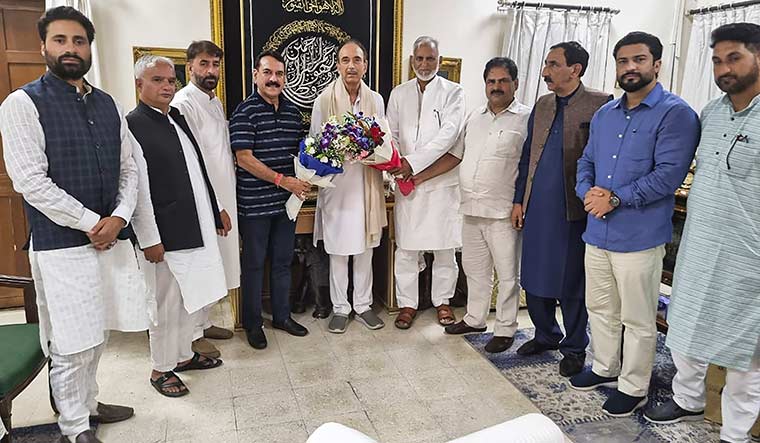After resigning from the Congress on August 26, veteran leader Ghulam Nabi Azad claimed that when the G23—a group of 23 leaders unhappy with the working of the top brass, especially Rahul Gandhi—flagged the abysmal drift in the party, the “coterie” unleashed its “sycophants” on them. “My mock funeral was held in Jammu,” said Azad. “Those who committed such indiscipline were feted in Delhi by AICC (All India Congress Committee) general secretaries and Rahul Gandhi.”
The former Jammu and Kashmir chief minister, having said his piece, now wants to launch his own party. “I am in no hurry, but keeping in mind that elections are likely to be held in Jammu and Kashmir, I have decided to launch a unit there soon,” he said.
He will arrive in Jammu on September 4 for consultations with supporters on this issue. As many as 12 senior J&K Congress leaders, including four former ministers, have left the party to join Azad. Scores of grassroots workers, too, have gathered by his side.
“The Congress has lost its momentum in contributing towards the future of my state,” former minister R.S. Chib wrote in his resignation letter to Congress interim president Sonia Gandhi. “Keeping in view the turmoil that the J&K has witnessed, the people require a decisive leader like Azad to guide them towards a better future.”
Former minister G.M. Saroori said that 2,500 political leaders and workers had already pledged their support to Azad. Before submitting their resignations, the Azad loyalists had met him in Delhi. “His (Azad’s) services are needed in Jammu and Kashmir,” said Saroori. “We are sure he will be the next chief minister.”
According to sources, more Congress leaders, like former deputy chief minister Tara Chand, former minister Dr Manohar Lal Sharma and former legislator Balwan Singh, are also thinking of quitting the Congress.
Rattled by the desertions, Congress leaders alleged that Azad was working for the BJP. Said G.A. Mir, former state Congress president known to be close to the Gandhis: “The Congress has raised the flag to unite the country under the leadership of Rahul Gandhi. Unfortunately, Azad has decided to move away from the Congress and join the other camp.”
He also called Azad’s future party a ‘maha offshoot’ of the BJP, and added that he had heard of the BJP’s B and C teams, but now the A (Azad) team was coming.
Mir claimed that Azad’s exit would end factionalism in the Congress. “His resignation will give our workers motivation to fight the communal forces,” he said. “For the time being, some people will feel the party has been weakened, but in the long run, it will emerge as a strong force across Jammu and Kashmir.”
Azad’s decision to leave the Congress followed his resignation as chairman of the Congress’s Jammu and Kashmir campaign committee on August 16. He was upset over the party’s decision to name Vikar Rasool, considered his loyalist, the J&K Pradesh Congress Committee president. Sources said that Azad himself had suggested Rasool’s name, but he was unhappy over being side-lined on decisions regarding the JKPCC. He was also upset with many of the decisions the AICC had taken on Jammu and Kashmir.
Last November, Azad had become quite active in the Chenab valley, drawing thousands to his rallies. He talked about the restoration of statehood, jobs and development, and maintained a balanced tone on Article 370.
Soon enough, his loyalists revolted against Mir, who was then JKPCC president. They argued that the party had performed poorly in every election under Mir and said that, “Unscrupulous sycophants have captured and hijacked the functioning of the PCC”. They also pointed out that not only did Mir lose the 2019 Lok Sabha elections, but his son also lost the 2020 District Development Council (DDC) poll in his home constituency in Anantnag district.
Political observers believe that with Azad throwing his hat into the ring, the upcoming elections would become a three-way contest. He is expected to eat into the votes of the fragile People’s Alliance for Gupkar Declaration (PAGD)—led by National Conference president Farooq Abdullah—which would benefit the BJP.
Though Azad’s focus will be on the Muslim parts of the Chenab Valley and Pir Panjal, including the districts of Rajouri and Poonch, he also has influence among Hindu voters in Jammu. “During the DDC polls, the NC and the PDP won a good number of seats in Jammu, mostly in Doda, Kishtwar, Bhaderwah, Rajouri and Poonch, because they put up joint candidates,” said a senior PDP leader in Jammu. “That may not be possible this time because of Azad.” He added that the NC alone won 25 DDC seats in Jammu, which gave the BJP a big scare.
If the Gupkar Alliance decides not to contest the polls unitedly, many leaders from regional parties would join Azad. “Many political leaders who had joined smaller parties under duress after Article 370 was removed are now looking to join Azad,” said a senior political leader. “Shoaib Lone, who had joined the J&K Apni Party, is now planning to join Azad. There are others who are not feeling comfortable in smaller parties, including some leaders from north Kashmir.”
Altaf Bukhari, J&K Apni Party president, accused Azad of “striking a deal” with the BJP and helping it abrogate Article 370.
The BJP has cultivated a vote bank in the Dogra heartland of Jammu, Samba, Kathua, Udhampur and parts of Reasi district, but Azad can win over Hindu voters who are displeased with the BJP and do not like the Congress either.
Winning seats from Muslim-majority areas is key to the BJP’s target of winning more than 50 seats in Jammu and Kashmir. In that context, the party apparently feels that it can do business with Azad.
After delimitation, the number of Muslim-majority seats in Jammu has been reduced to nine, from 13. If Azad’s party can win a chunk of those seats and a few in Kashmir, he will become kingmaker in the valley.


